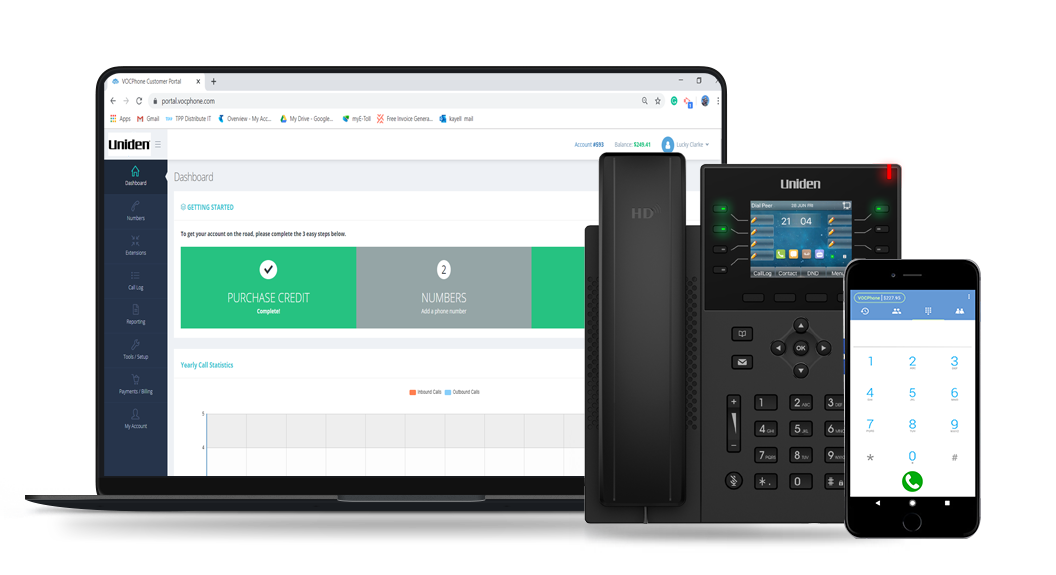
Communication without the cords: Why it’s time to consider wireless VoIP phones
Explore whether wireless VoIP phones can truly replace your old-school PBX system and why so many businesses are making the move.

Explore whether wireless VoIP phones can truly replace your old-school PBX system and why so many businesses are making the move.
While traditional PBX systems have long served businesses with internal and external voice communications, they’re showing signs of age in a digital-first world. With bulky on-site hardware, limited scalability, and rigid call routing, PBX systems often struggle to meet the demands of hybrid and remote work models.
On the other hand, wireless VoIP phones connect through the internet, enabling businesses to make and receive calls using cloud-based platforms. With lower operational costs, higher call quality, and improved mobility, wireless VoIP systems are fast becoming a popular alternative to on-premise PBX setups.
For businesses considering an upgrade, the key question is no longer if wireless VoIP systems can replace traditional systems, but how quickly the transition can deliver ROI, scalability, and improved user experience.

Traditional PBX phone systems are confined to physical locations and rely on fixed wiring and desk phones. Wireless VoIP systems, on the other hand, offer mobility by design. They operate through cloud infrastructure and Wi-Fi networks, allowing staff to make and receive calls from anywhere—on-site, at home, or on the move. This flexibility supports hybrid and remote work models, empowering your team to remain connected and productive no matter where they are. With VoIP, your office travels with you.
Implementing a traditional PBX setup can be expensive, requiring significant investment in on-premise hardware and technical expertise for maintenance. Wireless VoIP eliminates many of these upfront and recurring costs. Setup is often as simple as plugging in a pre-configured handset or downloading an app. Cloud providers manage system updates and infrastructure, reducing IT overheads. For businesses aiming to cut communication expenses without compromising quality, VoIP presents a compelling alternative.
PBX systems often require add-on hardware or software to access advanced features like voicemail-to-email or call routing. These come at a premium and can complicate your setup. With wireless VoIP phones, these features are typically included as part of your subscription. You get enterprise-level functionality out of the box, from call forwarding and conferencing to call analytics and CRM integration. It's a smarter way to equip your team with tools that improve communication and customer experience.
With voicemail-to-email functionality, missed calls are no longer a guessing game. Whenever someone leaves a voicemail, the system automatically records the message, converts it into an audio file or a written transcription, and sends it straight to your email inbox. This ensures you’re always in the loop. It's particularly useful for busy professionals who want to quickly scan messages or forward them to colleagues.
Cloud-based phone systems provide detailed analytics dashboards that give you real-time and historical data on how your business communicates. You can also monitor metrics like total call volume. These insights help managers assess performance, staffing needs, and areas for improvement. Whether you're tracking customer service KPIs or refining sales outreach strategies, analytics help you make data-driven decisions.
Cloud phone systems seamlessly integrate with workplace apps like Microsoft Teams, Slack, Google Workspace, and other CRM or project management tools. These integrations let you initiate or log calls directly within your daily apps, sync contact lists, and automate call records. This reduces the need to switch between platforms and ensures that important call data is captured consistently across your systems.
Worried about changing providers and losing your established business phone numbers? With number porting, that’s no longer a concern. Wireless VoIP systems allow you to retain your existing phone numbers—even local, mobile, or toll-free numbers—when switching to a new service. This means you can upgrade your phone infrastructure without disrupting your customer relationships, marketing materials, or brand identity.
In flexible work spaces or shared offices, hot desking allows employees to use any available desk. Cloud-based phone systems make this easy by enabling users to log into any compatible device with their credentials. Once logged in, their personal extension, settings, voicemail, and call history are instantly accessible. It’s an efficient solution for co-working spaces and businesses embracing hybrid work schedules.
Uniden is trusted by thousands of businesses across Australia. Our cloud-based phone systems combine cutting-edge hardware with reliable cloud infrastructure, helping companies transition away from ageing PBX systems with ease. Whether you're a growing SME or an enterprise with multi-site operations, we help modernise your communications with scalable, mobile-ready solutions tailored to your team’s needs.

Say goodbye to the cost and complexity of traditional PBX systems and move towards a future-proof communication solution.
Yes, a stable internet connection ensures high-quality calls. Most modern networks easily support the bandwidth needed for VoIP.
Yes, number porting allows you to retain your existing business numbers when switching to wireless VoIP systems.
You can use dedicated VoIP handsets, mobile apps, softphones on computers, or even headsets with integrated systems.
Not at all. Most providers offer plug-and-play handsets and cloud-based setup without the need for extensive wiring or technicians.
Yes, VoIP is ideal for multi-site businesses. You can manage all locations through a single platform and offer seamless call transfers.